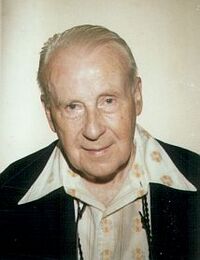George Ivask facts for kids
Quick facts for kids
George Ivask
|
|
|---|---|
 |
|
| Born | September 14, 1907 Moscow, Russian Empire |
| Died | February 13, 1986 (aged 78) Amherst, Massachusetts, United States |
| Education | Tartu University |
| Period | 1929–1986 |
| Genre | Poetry, literary criticism |
George Ivask (Russian: Yuri Pavlovich Ivask, Юрий Павлович Иваск, Estonian: Jüri Ivask; September 14, 1907 – February 13, 1986) was a talented writer. He was born in the Russian Empire but had Estonian roots. He became known as a poet and someone who wrote about books and literature (a literary critic). Later in his life, he moved to America and became a scholar who studied Russian literature.
About George Ivask
George Ivask was born in Moscow. His father was a merchant of Estonian background, and his mother was Russian. In 1920, when George was 13, his family moved to Estonia. There, he went to Tartu University and graduated in 1932.
In 1943, during World War II, he joined the German army. However, he never went to the front lines because he wasn't healthy enough. In 1944, he moved to Germany to avoid the advancing Red Army. In 1946, he started studying Slavic studies (languages and cultures of Slavic countries) and philosophy at Hamburg University.
In 1949, George Ivask moved to the United States. He continued his studies at Harvard University, earning a special degree in Slavic languages and literature. In 1955, he became an American citizen. From 1969 to 1977, he taught at several universities. These included the University of Kansas, Indiana University, and Washington University in St. Louis. After that, he became the head of the Russian literature department at the University of Massachusetts in Amherst. Ivask retired from teaching in 1977. He was married to Tamara Ivask.
His Work and Writings
George Ivask started sharing his poetry in 1929. Sometimes he used different names, called pseudonyms, like B. Afanasyevsky or G. Issako. He often published his poems in Put, a magazine started by Nikolai Berdyaev. Berdyaev, along with Georgy Fedotov, greatly influenced Ivask's ideas.
His first book of poems, called Severny Bereg (The Northern Shore), was published in 1938. Ivask described his writing style as 'neo-barocco'. This means it had a rich and complex style, similar to an old art movement. He saw himself as following the style of an older poet named Gavriil Derzhavin. One of his most remembered works is Homo Ludens (Playing Man), which came out in 1973. This was an autobiography (a story of his own life) told through poems, but it was never finished.
Ivask also put together and edited a large collection of poems called In the West (На Западе). This book, published in New York in 1953, featured poems from Russian writers who had moved away from their home country. He also helped publish books by Georgy Fedotov and Vasily Rozanov. He wrote many critical essays and a book about the Russian thinker Konstantin Leontyev in 1974.
In 1983, Ivask wrote a poem called "A Greeting Word from an Orthodox Man." It was published in a Polish magazine in Paris. This poem made a big impression on Pope Paul II. The Pope even invited Ivask to the Vatican for a special meeting. After George Ivask passed away, his writings and papers were kept at Yale University.
George Ivask died in 1986 from a heart attack. He collapsed near a pond on the campus of the University of Massachusetts in Amherst.

